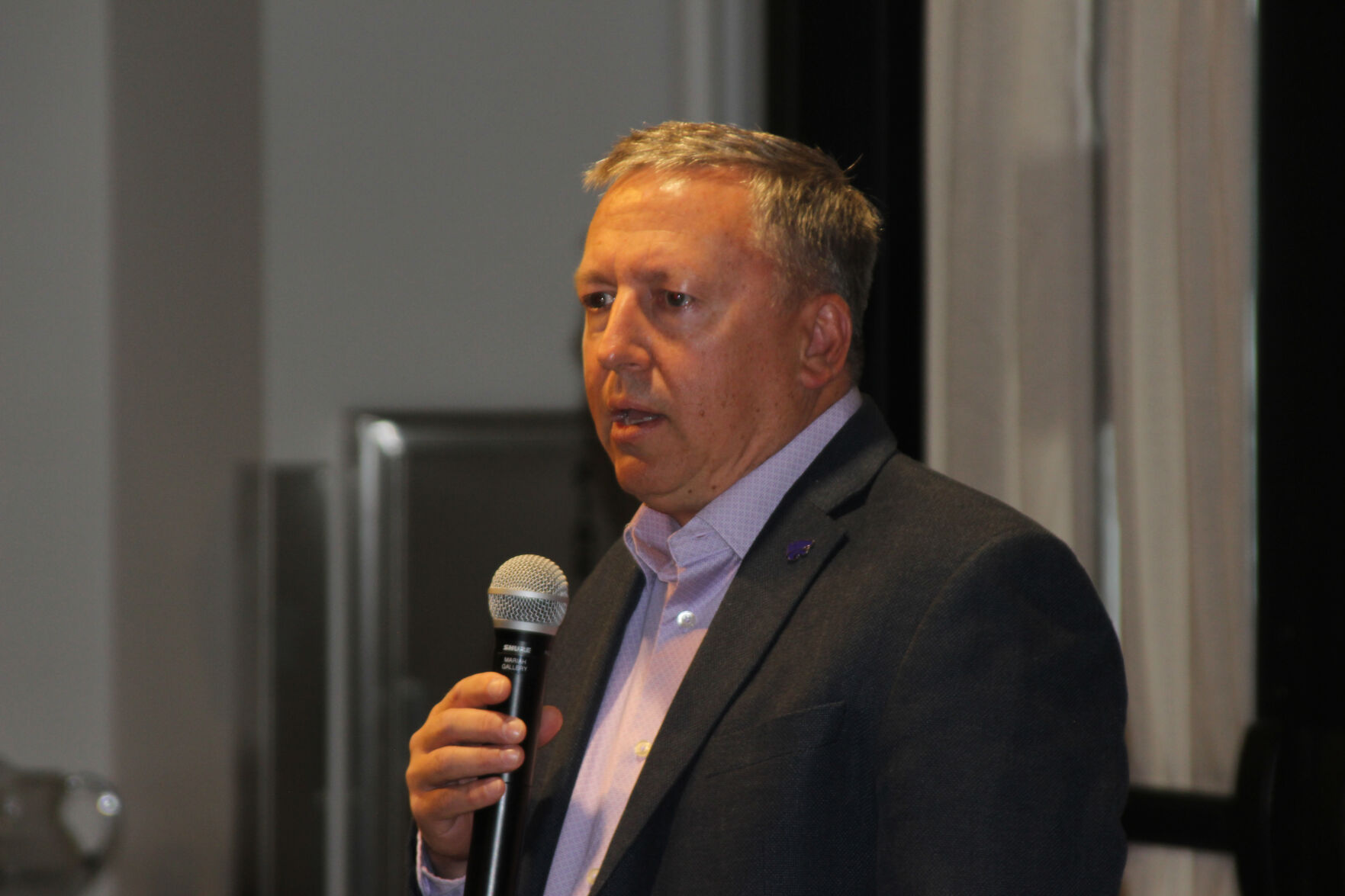Meeting and visiting in-person is the best way Kansas State University President Richard Linton has to connect the college with Sunflower State residents.
Linton was in Dodge City on Sept. 27 and spoke during the Ford County community forum in the Mariah Gallery at the Boot Hill Museum and with members of the media afterward. Linton touched heavily on agriculture and the importance that K-State Research and Extension has in all Kansas counties. He was accompanied by Provost Charles Taber, who is also the executive vice president for K-State, and Tabor and other university officials offered remarks and listened during the tour.
Agriculture production and food systems is the strongest sector of the Kansas economy, Linton said, and it is at the forefront of western Kansas’ economy. He learned that 10% of the beef that feeds the country has ties to Ford County and noted the growth in large-scale dairies in western Kansas.
As part of the listening tour, he wanted Kansans to know K-State is an important partner in crops and livestock sectors while building on strengths, such as the National Bio and Agro-Defense Facility, also located in Manhattan, because it can help protect animal agriculture from biological threats and diseases. They all work within an interdisciplinary framework in concert with private sector and other sectors.
Serving all Kansans
Linton, now in his ninth month as president, said a land-grant university is dedicated to serving its people and he really likes the slogan “the university for Kansans” and how the Extension program helped to carry the message to all 105 counties in the state.
His goal is to rebuild programs and make them relevant to meeting the future needs of agriculture, communities and the students he called the future of Kansas. The COVID-19 pandemic stopped face-to-face visits, as an example, but his vision of rebuilding goes further.
As a former dean of agriculture, he knows it is important for farmers and ranchers throughout the agriculture system to work together to be a powerful economic generator and that means Extension and cooperative research.
That means agronomy research to help row crops and wheat production and help the beef and dairy industries that are key to western Kansas. In areas that depend on the Ogallala Aquifer, K-State needs to be a part of the solution with agronomy, engineering, geology and education to extend its life and help research, Extension and private partners all hold the key to success.
“Private sector partnerships make sense,” he said.
Linton also spoke on the $125 million ag innovation project, which includes a $25 million grant from the Kansas Legislature. In addition, the state will award another $25 million if K-State raises $75 million in private gifts over the next year. The monies will be used to renovate Call and Weber halls and replace Shellenberger Hall, which houses the Department of Grain Science and Industry and International Grains Program, with a new facility. The improvements are part of a new global center for food and grain innovation and advanced bio ag innovation hub for agronomy research and innovation.
Several Extension personnel said there is a continued need to support counties and districts with personnel and to ensure funding at research centers and experiment farms.
Helping in other ways
The university has a significant role in helping first-generation students, he said, particularly Hispanic students. Marissa Ramirez, senior in construction science and management, Dodge City, was one of those students who shared her story about moving from Mexico as a 10-year-old child and ultimately reaching her dream with a construction science degree. Joshua Diazdeleon, a senior in elementary education, Liberal, explained his experience and the importance of developing relationships with teachers and college professors.
Linton said each region and county has unique challenges—and opportunities—and one reason he wanted to make the trip was to directly hear from residents. During the community forum several people in the audience told stories about students who can speak fluent English and how they serve as the translator for their parents who may only speak Spanish. They noted that often those students feel the pressure to stay home and help with the family rather than pursue a college career.
Other comments included the continued need to make sure graduates have opportunities to return to the region. Several stories were shared about the successes of local employers who are committed to making the happen.
His visit also included a listening and learning session for preparing and supporting the local workforce. A tour of the Rattlesnake Creek watershed provided insight about management efforts from stakeholders that included the Nature Conservancy, K-State Research and Extension and the private sector to make sure irrigators and wildlife could both be supported.
A tour of the Ford County Office of Emergency Management in conjunction with Extension was conducted to learn about tornado and wildfire response.
Sign up for HPJ Insights
Our weekly newsletter delivers the latest news straight to your inbox including breaking news, our exclusive columns and much more.
Dave Bergmeier can be reached at 620-227-1822 or [email protected].



